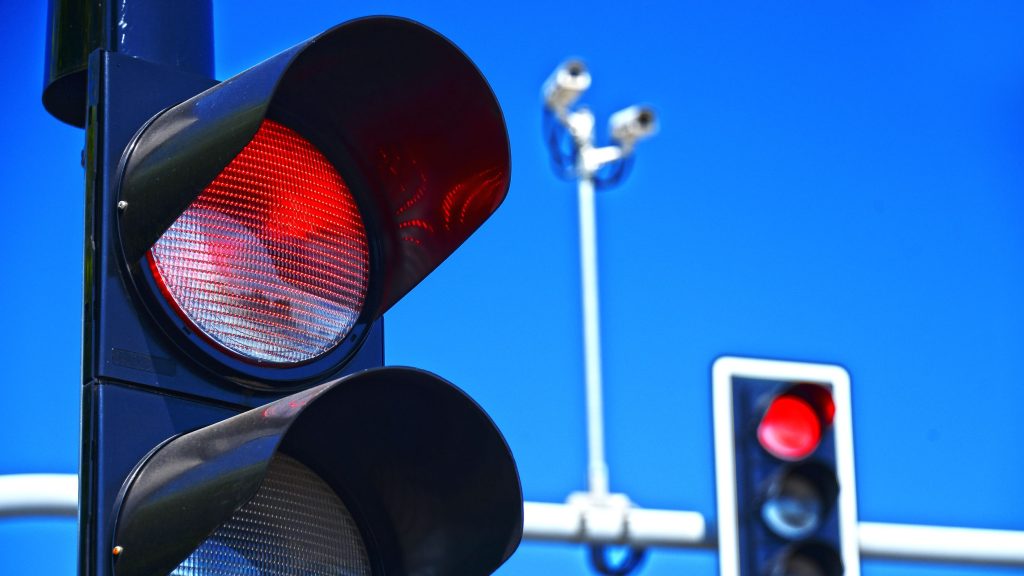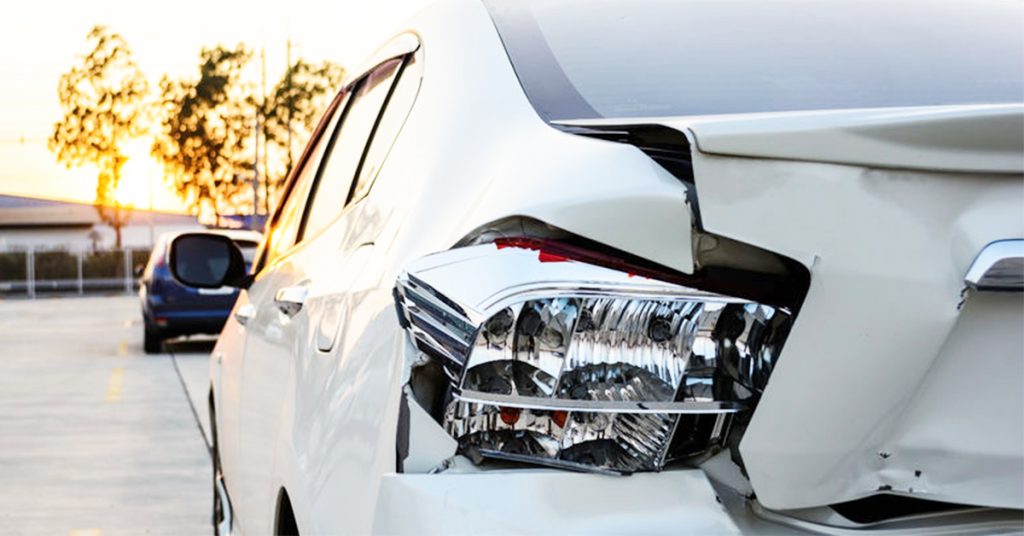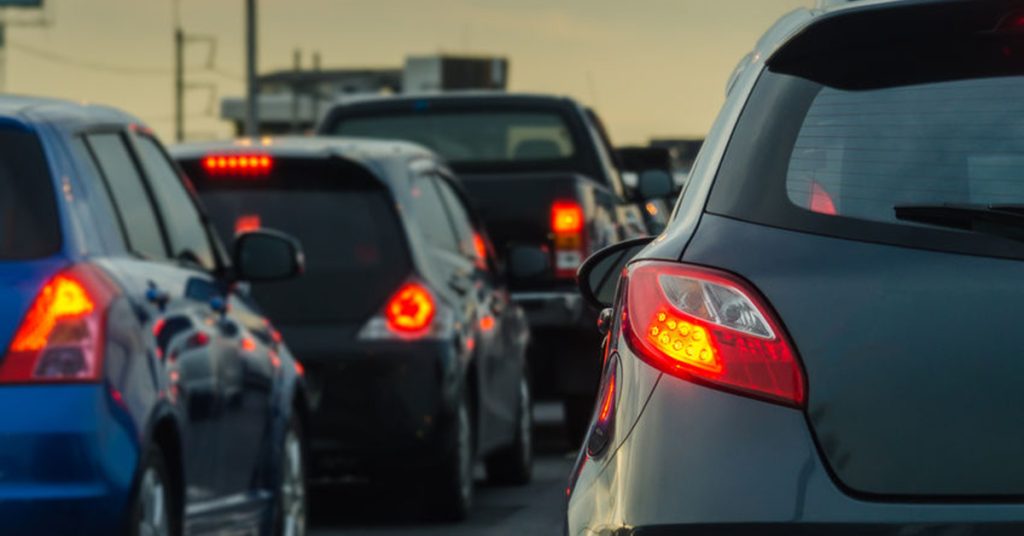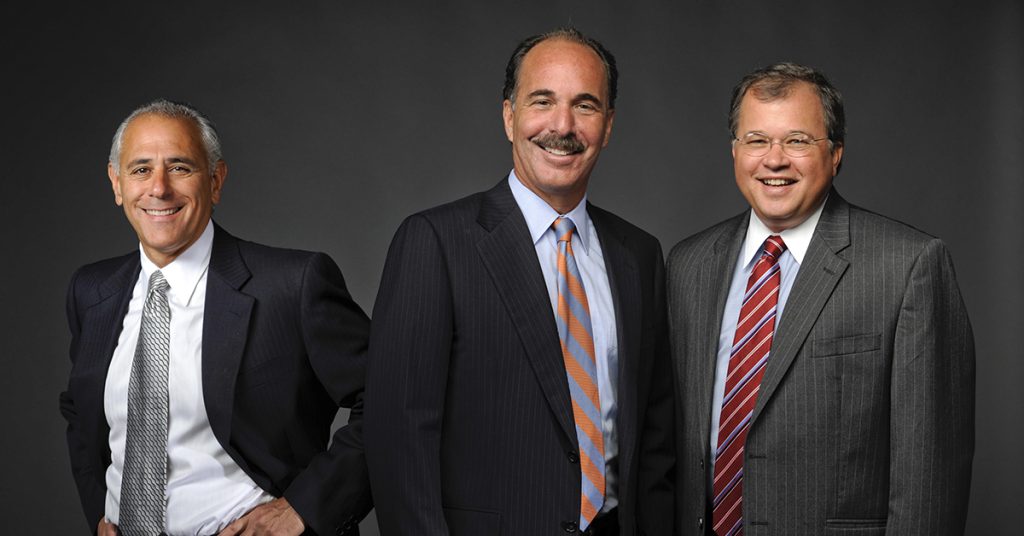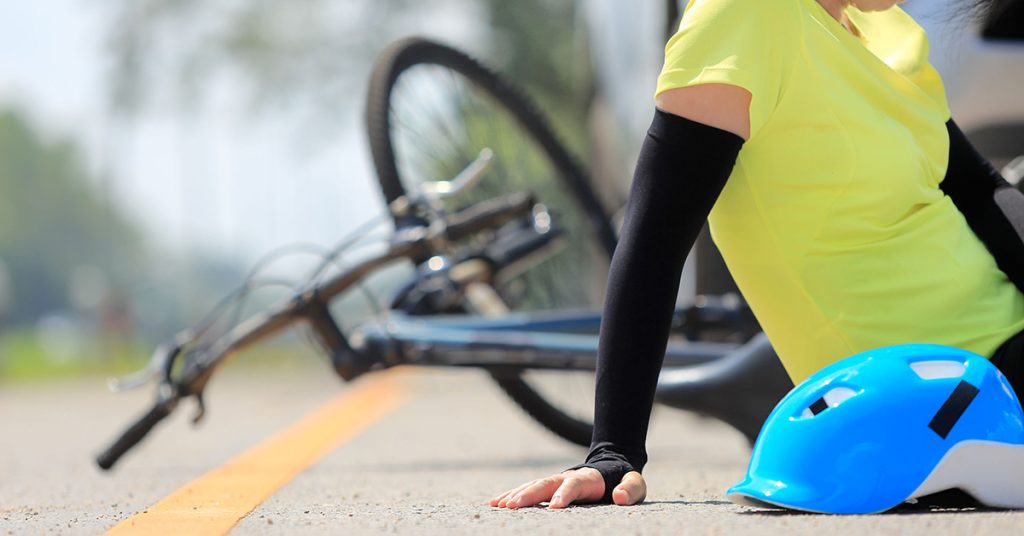Motor Vehicle Accidents
COVID-19 Update for New and Existing Clients
Breakstone, White & Gluck is open. Here is our latest update on how we are serving clients during the COVID-19 crisis: www.bwglaw.com/covid-19.
Massachusetts Considers Red Light Cameras to Catch Traffic Offenders

Massachusetts lawmakers are considering legislation to allow communities to install red light cameras.
In Massachusetts, drivers are getting a strong warning to slow down this week as the state Senate debates red light cameras.
The state Senate is scheduled to debate legislation proposed by Sen. William Brownsberger and redrafted by the Ways and Means Committee.
The proposed bill would grant Massachusetts cities and towns new authority to install automated camera systems to capture vehicles that violate traffic laws at intersections, according to The Boston Globe. The goal is safer roads; the AAA Foundation for Traffic Safety has reported red light cameras have contributed to a 14 percent reduction in traffic deaths at intersections.
Drivers who violate traffic laws could end up receiving a citation and fine, without ever being stopped by a police officer. The fine would be $25 and tied to the vehicle registration. The person listed on the vehicle registration will receive the traffic citation, not necessarily the person driving at the time. Violations would not count toward Massachusetts auto insurance surcharges.
This is an important proposal and drivers, cyclists and pedestrians want to watch this week. Many, many traffic crashes happen in intersections, when drivers speed through lights, veer out of their lanes or neglect to give cyclists and pedestrians enough space. At the same time, there are many concerns about privacy and how broad laws should reach.
Beyond Massachusetts, 20 states have passed laws allowing red light cameras, according to the Governors Highway Safety Association. These states stand divided on authority; 11 states fully permit use while 9 states only allow use in specific situations.
Massachusetts Red Light Camera Legislation
Under the Massachusetts proposal, communities could install one traffic camera for every 2,500 residents. Signs must be posted and visible warning drivers approaching the intersection.
To address privacy concerns, communities would be directed to capture photos without identifying the driver or passengers in the vehicle, or any of their belongings. Photographs would be destroyed within 48 hours.
Drivers can be cited for failure to stop for a red light, making an illegal turn at a red light or speeding. Drivers may be cited for traveling at least 5 miles per hour over the speed limit. There will be an appeals process for drivers.
The law should not impact green light or yellow light laws. Lawmakers wrote in language that says a vehicle can be across the line during a yellow light, according to the Globe report.
Communities will be compensated for the costs of installation and operating the camera system. The state’s Transportation Trust Fund will receive the rest of the revenue from citations.
History of Opposition for Red Light Cameras in Massachusetts
Massachusetts has long opposed the idea of red light cameras due to privacy concerns. More than a decade ago, individual communities attempted to lobby state legislators for the right to install traffic cameras, without success.
But now, growing traffic safety concerns has rekindled proposals in Massachusetts and across the country.
- Last year, the AAA Foundation for Traffic Safety reported red light running crashes have reached a 10-year high in the U.S.
- Fatal red light car crashes have increased 28 percent since 2017.
- About 35 percent of the victims were the drivers who thought they could race through the red light.
AAA Recommendations for Red Light Camera Use
AAA recommends communities install traffic cameras at intersections with demonstrated patterns of red light violations or crashes. Before launching red light cameras, communities should have established overall traffic safety and engineering plans, AAA says. Law enforcement should directly supervise red light cameras and drivers should be given fair notice with traffic signs and other outreach.
Breakstone, White & Gluck – Free Legal Consultation
Breakstone, White & Gluck provides aggressive and experienced representation to those injured or killed by the negligence of others. Our attorneys have been consistently recognized for their results for our clients, including as Top 100 New England Super Lawyers, Top 100 Massachusetts Super Lawyers and by Best Law Firms as a Tier 1 Firm in Personal Injury and Medical Malpractice in the Boston Metropolitan region.
If you have been injured, learn your legal rights. Contact our car accident lawyers today at 800-379-1244 or 617-723-7676. You can also use our contact form.
State of Massachusetts Releases Education Materials on New Hands-Free Driving Law

Hand-held cell phone use becomes illegal in Massachusetts on Feb. 23, 2020, when the new hands-free law takes effect.
The state of Massachusetts has published a new web page and pamphlet on the new hands-free driving law, which takes effect on Feb. 23rd.
While Massachusetts passed a texting while driving ban in 2010, it was the final New England state to enact hands-free legislation in November. When the new law at last takes effect, drivers will be prohibited from using cell phones and electronic devices, unless they are in hands-free mode or they have to call 911 for an emergency.
Distracting driving is a serious safety threat on the roads, causing 9 deaths and more than 1,000 injuries each day in U.S. traffic crashes, according to the CDC. This goes beyond just cell phone use. Think of it as any activity which takes your eyes off the road, your mind off the road or your hands off the wheel.
Texting while driving and cell phone use cause many injuries each year. If the news stories have not deterred you, the new Massachusetts hands-free law should; it is about to become much easier for police to identify drivers who are using cell phones illegally.
Penalties for violating the Massachusetts hands-free law:
For a driver’s first offense, there is a $100 fine. The second offense carries a $250 fine and drivers must complete a distracted driving education program. Third and subsequent offenses can lead to a $500 fine and drivers will have to attend the education program. At this point, drivers can also face an insurance surcharge.
What becomes illegal under the Massachusetts hands-free law:
No Holding Your Cell Phone. Cell phones must be mounted or installed in your vehicle before you use hands-free technology or voice-to-text communication. Drivers can only touch their cell phones to make an initial swipe to activate hands-free mode.
No Touching Your Cell Phone Screen. Drivers cannot touch cell phones to email, check social media or watch video. All other Internet use and app use is also banned.
Get Your GPS Ready. GPS is a critical tool for many drivers. Going forward, be aware that you can only activate your GPS from an electronic device which is installed in your vehicle or properly mounted on the dashboard.
No Cell Phone Use at Red Lights. You can only pick up your cell phone if your car is stationary and safely outside the travel lane. Hand-held cell phone use at stop signs and red lights is a violation. Along with drivers, cyclists are also banned from using hand-held electronic devices.
Visit the state of Massachusetts web page to learn more.
Our Final Note
Massachusetts drivers must continue to use caution under the new hands-free law. Even if you follow the law, hands-free doesn’t mean distraction- or accident-free.
Free Legal Consultation – Boston Personal Injury Lawyers
Breakstone, White & Gluck is a Boston personal injury law firm with extensive experience handling Massachusetts car accident claims for those injured by negligent driving. If you have been injured, our attorneys are here to advise you of your rights to file a claim against the driver or another party who may be at fault. For a free legal consultation, call Breakstone, White & Gluck at 800-379-1244 or 617-723-7676. You can also use our contact form.
Protecting Yourself Before and After a Car Accident in Massachusetts

Breakstone, White & Gluck offers a series of new articles to help you understand your rights and responsibilities under your Massachusetts auto insurance policy. As part of these articles, we share tips on how to buy more coverage to help yourself or your family members should you ever be injured or your vehicle damaged. Another driver may be at fault, but if they are uninsured or underinsured, you may need to look to your own auto insurance policy.
Getting Started with Massachusetts Auto Insurance
When someone buys a car, they learn a tough lesson: auto insurance can be costly for Massachusetts drivers. But under Massachusetts law, drivers are required to purchase an auto insurance policy and this is essential if you are injured in a car crash. Our Boston car accident lawyers share tips for getting started.
Infographic: What You Need to Know About Auto Insurance in Massachusetts
Our infographic explains Personal Injury Protection (PIP) benefits and our recommendations for Bodily Injury Coverage, Underinsured and Uninsured Motorist Coverage and Medical Payments Coverage.
How to File a Massachusetts Motor Vehicle Crash Operator Report
While we hope you are never involved in a crash, drivers can take a few minutes to familiarize themselves with the Massachusetts motor vehicle crash operator report. It is your responsibility to submit this form to your auto insurer if you are involved in a car accident resulting in more than $1,000 property damage or injury.
More Auto Insurance Articles
Still have a question? Please visit our website, where we have more articles on insurance coverage for drivers, bicyclists and motorcyclists.
Free Legal Consultation
Breakstone, White & Gluck – Boston Car Accident Lawyers
Breakstone, White & Gluck represents those injured in car accidents, truck crashes and other traffic incidents across Massachusetts. Our firm is based at 2 Center Plaza across from Boston City Hall and we offer a free legal consultation by telephone. Contact our firm today at 800-379-1244 or 617-723-7676 or use our contact form.
Getting Started with Massachusetts Auto Insurance
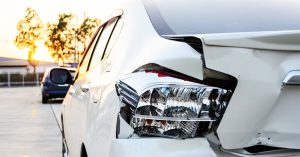 When someone buys a car, they learn a tough lesson: auto insurance can be costly and confusing for Massachusetts drivers. There are unfamiliar terms, contract language and many of us do not understand the coverages we need to buy – and how much of these coverages. But drivers are required to purchase an auto insurance policy in Massachusetts.
When someone buys a car, they learn a tough lesson: auto insurance can be costly and confusing for Massachusetts drivers. There are unfamiliar terms, contract language and many of us do not understand the coverages we need to buy – and how much of these coverages. But drivers are required to purchase an auto insurance policy in Massachusetts.
In this article, our Boston car accident lawyers share tips for getting started with your Massachusetts auto insurance policy.
What is a Massachusetts Auto Insurance Policy?
- What is a Massachusetts Auto Insurance Policy?
- Do I Need to Buy a Massachusetts Auto Insurance Policy?
- Do I Need to Purchase Other Types of Massachusetts Auto Insurance Coverage?
- What Happens if I Do Not Purchase Auto Insurance in Massachusetts?
- What if An Auto Insurance Company Refuses to Sell Me An Auto Insurance Policy?
- How Can I Lower My Auto Insurance Premium in Massachusetts?
- Are My Family Members Covered by My Auto Insurance Policy?
- How Do I Keep My Auto Insurance Policy in Good Standing in Massachusetts?
- What Should I Do if I am Injured in a Car Accident in Massachusetts? Do I Need to Contact My Auto Insurance Company?
What is a Massachusetts Auto Insurance Policy?
Your Massachusetts auto insurance policy is a contract between you and your auto insurance company. You agree to pay a premium and follow the terms of the policy. Your insurance company will pay for certain costs associated with a car accident and other damage.
Do I Need to Buy a Massachusetts Auto Insurance Policy?
- You may purchase your policy directly from the company or through an auto insurance agent.
- Shop around; Different insurers now offer different discounts and pricing since Massachusetts deregulated the industry in 2008 and moved to “managed competition.”
- After you purchase auto insurance, you should carry your policy number with you and keep it in your car along with your state motor vehicle registration.
- Make sure you file away the Coverage Selections Page you receive. This shows your policy number and the coverages you have purchased.
Do I Need to Buy a Massachusetts Auto Insurance Policy?
Yes, you need to purchase a Massachusetts auto insurance policy. Under Massachusetts law, you must purchase the “compulsory” mandatory coverages, including:
Bodily Injury to Others
$20,000 per person;
$40,000 per accident
Do I Need to Purchase Other Types of Massachusetts Auto Insurance Coverage?
Personal Injury Protection
$8,000 per person, per accident
Bodily Injury Caused by an Uninsured Auto
$20,000 per person;
$40,000 per accident
Damage to Someone Else’s Property
$5,000 per accident
Do I Need to Purchase Other Types of Massachusetts Auto Insurance Coverage?
Drivers can buy additional optional types of coverage. These are recommended but not required by law. Optional coverages include:
- Bodily Injury
- Medical Payments
- Uninsured/Underinsured
- Property Damage
- Collision Comprehensive
We write about these coverage types on Breakstone, White & Gluck’s website. You can also click on our infographic below.
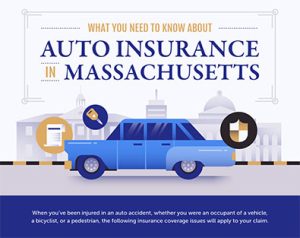
Click to view our infographic on buying Massachusetts auto insurance.
Our attorneys recommend you purchase as much auto insurance as you can afford and may need to cover your expenses if you were injured in a motor vehicle accident. This may include your medical bills, lost wages and other expenses.
As many drivers learn, the mandatory coverages are not enough to adequately cover the high costs after a crash – for financial losses associated with an injury and/or damage to a motor vehicle. Each year, we represent drivers who have been hit and injured by uninsured drivers.
If this happens to you, you too will have to look to your own auto insurance policy.
What Happens if I Do Not Purchase Auto Insurance in Massachusetts?
This is a serious offense. Under M.G.L. c. 90, § 34J, drivers may face potential penalties and fines if they are convicted or plead guilty to operating an uninsured motor vehicle. This charge may be brought against drivers caught operating their own vehicle without insurance as well as those who allow others to drive their vehicles without coverage.
Drivers can face fines of $500 to $5,000 and up to one year of imprisonment in a house of correction. The Registry of Motor Vehicles can also suspend a driver’s license for up to 60 days for a first offense and up to a year for second and subsequent offenses.
What if An Auto Insurance Company Refuses to Sell Me An Auto Insurance Policy?
Auto insurers can refuse to sell you auto insurance based on non-discriminary grounds and they can set their rates based on your driving history, where you live and other factors. They cannot, however, refuse based on your gender, race, national origin, marital status, religion, occupation or age. It is also against the law for an auto insurer to refuse to sell you a policy based on your income or information from a credit reporting agency.
Before you purchase auto insurance, read the Massachusetts Consumer Bill of Rights for Auto Insurance. This will help you respond if you are denied or want to question the auto insurer about their rates.
If an auto insurers turns you away, you can still purchase coverage through another company or the Massachusetts Auto Insurance Plan (MAIP). You automatically become eligible for this coverage if an insurer refuses to sell you a policy.
How Can I Lower My Auto Insurance Premium in Massachusetts?
Do your research online and learn your options for auto insurance discounts. You may qualify for discounts based on your driving record or organizations you belong to (such as AAA) or if you are 65 or old. Your teen may be eligible for discounts for getting good grades.
Ask about discounts when you meet an insurance agent. Discounts may vary between agents and you do not want to start working with an agent unless they offer the discounts you want.
Are My Family Members Covered by My Auto Insurance Policy?
Make sure you understand who is covered to drive your motor vehicle. Your auto insurance policy must list all licensed drivers in your household, even drivers who have their own auto insurance policies. You can exclude a member of your family by submitting an exclusion form.
You may be asked to list other drivers who use your vehicle. Work closely with your auto insurance agent on this point so you will have coverage if you need it.
How Do I Keep My Auto Insurance Policy in Good Standing in Massachusetts?
Read your policy before you sign it and ask your insurance agent questions. Ask as many questions as you need so you are aware of what you must do to stay in good standing.
If you move, update your address with your insurer promptly. Garaging a vehicle in another location may void your auto insurance. To avoid this, let your insurance agent know if you move to another home or apartment or when your teen heads to college and takes a car. This notification should be done promptly, within a few days.
Beyond this, follow state laws. Always operate with reasonable care. Do not speed or use your cell phone while driving. Pay your Massachusetts vehicle excise taxes on time. Keep your license and motor vehicle registration in your car, accessible if you are stopped by a police officer. Respond to traffic tickets and parking tickets promptly.
What Should I Do if I am Injured in a Car Accident in Massachusetts? Do I Need to Contact My Auto Insurance Company?
Review your auto insurance policy with your agent so you understand before an accident happens. You are required to notify your auto insurance company if you have been in a car accident resulting in property damage, injury or death. Massachusetts is a no-fault state and your auto insurer is responsible for paying your initial medical bills and lost wages under your PIP benefits coverage. But you have to alert your insurer that you have been injured to start this process.
If you have suffered serious injuries, it is important to consult an experienced Boston car crash lawyer to help you learn your legal rights. Contact Breakstone, White & Gluck of Boston for a free legal consultation at 800-379-1244 or 617-723-7676. You can also use our contact form.
How to File a Massachusetts Motor Vehicle Crash Report

If you have been injured, it is important to submit a Massachusetts motor vehicle crash operator report.
Have you reported your car accident to police?
While we hope you are never involved in a crash, drivers can take a few minutes to familiarize themselves with the Massachusetts motor vehicle crash operator report. Reviewing it can be helpful should you ever be in a crash – or witness one.
You can find the Massachusetts motor vehicle crash operator report online. It is available on the state of Massachusetts website.
Massachusetts Motor Vehicle Crash Operator Report – Driver Obligations
M.G.L. Chapter 90, Section 26 states the driver of a motor vehicle involved in a crash must report the collision if anyone was killed, injured or if property damage resulted in an excess of $1,000 in damage. This damage may be to a vehicle involved in the crash or to another type of property, such as a fence or building.
All drivers involved in crashes must file a report with the Massachusetts police department which has jurisdiction, their auto insurance company and the state Registry of Motor Vehicles.
Drivers have five days to file a report. The exception is when a driver suffered serious injury and is unable to file a police report right away.
Police departments must accept motor vehicle crash reports from any driver who unlawfully left the scene of a hit and run accident, even when the property damage falls under $1,000.
When a driver operates someone else’s vehicle under the influence of alcohol and there is a crash, the vehicle’s owner is responsible for reporting. They have five days to report the crash, based on when they learned about the crash.
Filing a motor vehicle crash report is your responsibility as a driver, whether you were injured or at fault in the crash. Failure to fill out a motor vehicle crash report has consequences. Drivers can have their licenses suspended by the RMV. They may also face criminal penalties.
Motor vehicle crash operator reports are the first step if you need to have your car repaired, replaced or if you have been injured. Police will consider the crash report you submit as part of their investigation in determining who was at fault and whether to cite that person. A traffic citation or criminal charges can support your claim seeking financial compensation for medical expenses, lost wages and other damages.
Filling Out The Report – What Drivers, Passengers and Others Should Know
If you are seriously injured, you cannot gather evidence and information at the accident scene. The investigation will largely fall to the police department which responds.
But if you can collect information, your cell phone is the best tool you have after a car accident. Take photos of everything, from your own vehicle to the roadway and the other vehicle.
This is where it becomes valuable to review the Massachusetts motor vehicle crash report before an accident. By doing so, you will have a better understanding what information to capture on the scene. As you can see, the report requests the other driver’s license and insurance information. It also asks drivers to report:
- Crash Location
- Vehicle You Were Driving
- You and Your Passengers
- Other Vehicles Involved in the Crash
- Non-Motorist(s) Involved
- Crash Conditions
- Crash Diagram
- Witness Information
- Property Damage Information
- Description of What Happened
Read the motor vehicle crash report for more information on each of these points. The report contains a section dealing with pedestrian accidents and bicycle accidents.
What’s Next
When you have been injured, receive medical attention first. Then you can file a police report, consult a Boston car accident lawyer or contact your auto insurance company if you were operating a motor vehicle when the accident occurred. You should decide which order based on the severity of your injuries. We recommend consulting a lawyer first if you have been injured. Our lawyers can explain your legal rights, answer your questions and assist in handling all the important steps, including contact with the auto insurance companies and the police department.
We have represented clients in communities across Massachusetts, from Boston to the North Shore, South Shore, Cape Cod, the New Bedford area and Worcester.
Avoid all contact, whether by phone or email, with the other driver’s auto insurance company. It is also recommended that you and your family stay off social media. Do not confide in friends or co-workers about a car accident until you have spoken to a lawyer and made some progress in your physical recovery.
For additional tips, please visit Breakstone, White & Gluck’s website page, “What to Do When You Have a Car Accident.”
About Breakstone, White & Gluck – Massachusetts Car Accident Attorneys
With more than 100 years combined experience, Breakstone, White & Gluck represents individuals and families who have been injured by negligent drivers in Massachusetts. Clients turn to us for our experience and results in cases involving car accidents, truck crashes, bus accidents and pedestrian accidents.
If you have been injured by a negligent driver, learn your legal rights. Call 800-379-1244 or 617-723-7676 or use our contact form.
Massachusetts Passes Hands-Free Driving Law
 Massachusetts has finally approved distracted driving legislation. Gov. Charlie Baker signed on Monday, establishing New England as a hands-free driving zone.
Massachusetts has finally approved distracted driving legislation. Gov. Charlie Baker signed on Monday, establishing New England as a hands-free driving zone.
According to The Boston Globe, the new distracted driving law will take effect on Feb. 23, 2020. Massachusetts police officers will issue warnings until the end of March, then citations will begin. This transition period is meant to help drivers get used to the new law. Become familiar with Bluetooth and other “hands-free” technologies now, and if you plan to use an electronic device for navigation, purchase a mount for your windshield or dashboard.
Until now, most drivers have been able to pick up cell phones to talk in Boston and across Massachusetts. However, under the 2010 texting while driving ban, drivers cannot text, read emails or use social media. This has helped deter some drivers, but overall, not enough without a handheld cell phone ban.
Come next year, Massachusetts drivers can only use cell phones under limited circumstances. Drivers can use electronic devices on “hands-free” mode (though they do get a single-swipe to activate or de-activate the “hands-free” mode). As we mentioned, they must use Bluetooth or a similar “hands-free” technology and mount navigation devices.
Police officers can stop drivers as a primary offense, which is more leeway than they have in enforcing seat belt use. Officers will be required to collect data – including age, race and gender – when they issue a warning or citation. The state will use this data to monitor potential racial profiling by police departments.
The new Massachusetts distracted driving law brings notable consequences. These alone are good financial motivators for putting down your cell phone.
Under the new law, drivers will be fined $100 for the first offense, $250 for the second offense and $500 for the third offense (and any subsequent offense). Second-offenders have to participate in a driver safety course. Drivers can also face an insurance surcharge.
Safety is the most important point. Cell phone use is responsible for more than 1 of 4 car crashes, according to the National Safety Council. Distracted drivers killed 3,166 people across the U.S. in 2017, according to the National Highway Traffic Safety Administration. These are hard numbers to hear.
Massachusetts now joins every other New England state in improving hands-free cell phone legislation. Maine was the last state to approve legislation this past summer. According to the National Conference of State Legislature, 20 states already have laws which ban handheld cell phone use, so Massachusetts could be the 21st.
Read the law: AN ACT REQUIRING THE HANDS-FREE USE OF MOBILE TELEPHONES WHILE DRIVING, 2019 Mass. Acts 122
Boston Car Accident Lawyers – About Breakstone, White & Gluck
At Breakstone, White & Gluck, our Boston car accident lawyers have over 100 years combined experience and provide expert investigation into car crashes involving negligent cell phone use. We represent clients who have been injured by negligent driving across Massachusetts, including in Boston, Cambridge, Somerville, Quincy and Braintree. South of Boston, our attorneys have represented numerous clients, including those injured in Brockton, Plymouth and Cape Cod, as well as in Framingham, Worcester and north of Boston, Salem, Peabody, Newburyport and Saugus.
If you have been injured, learn your legal rights. Call 800-379-1244 or 617-723-7676 or use our contact form.
Breakstone, White & Gluck Recognized by Super Lawyers
It is our pleasure to announce that Super Lawyers has recognized Breakstone, White & Gluck in its 2019 rankings. This was the 16th year our attorneys have been recognized.
Marc L. Breakstone has been selected to the Top 100 New England Super Lawyers, Top 100 Massachusetts Super Lawyers and the 2019 Massachusetts Super Lawyers list, recognized as a top-rated medical malpractice attorney in Boston.
David W. White has been selected to the 2019 Massachusetts Super Lawyers list, recognized as a top-rated personal injury attorney in Boston. Attorney White has previously been selected to the Top 100 Massachusetts Super Lawers seven times and to the Top 100 New England Super Lawyers three times.
Ronald E. Gluck has been selected to the 2019 Massachusetts Super Lawyers list, recognized as a top-rated personal injury attorney in Boston.
Super Lawyers is a rating service which highlights outstanding lawyers from more than 70 practice areas. Selections are made using a multiphase process, including a statewide survey of lawyers, independent research and evaluation and peer reviews from within a practice area.
Super Lawyers recognizes the top 5 percent of lawyers from that process. Another 2.5 percent of attorneys are selected to the Rising Stars list, which showcases talented attorneys under age 40.
About Breakstone, White & Gluck
Over 100 Years Combined Experience in Personal Injury Plaintiff Representation
Breakstone, White & Gluck is respected across Massachusetts for our commitment to our clients and our results. We have been representing plaintiffs in personal injury and medical malpractice cases as a firm since 1992. Each of our partners has over 30 years of experience.
Our firm is experienced in handling all types of personal injury cases, including those involving catastrophic accidents, wrongful death, motor vehicle accidents, product liability, premises liability, construction accidents, explosions, spinal cord injuries, head injuries and traumatic brain injuries. Our attorneys are regularly interviewed in the local media for their expertise in these specialties and Massachusetts insurance laws.
We have always been active in the Massachusetts legal community and are dedicated to sharing our knowledge with other attorneys through continuing legal education and professional organizations. Attorney Marc L. Breakstone and Attorney Ronald E. Gluck serve on the Board of Trustees for the Massachusetts Academy of Trial Attorneys (MATA), while Attorney David W. White is a past president of the Massachusetts Bar Association. We are also committed to giving back and working to prevent injuries. Through our Project KidSafe campaign, our attorneys have given away more than 25,000 free bicycle helmets to children across the state of Massachusetts.
We invite you to visit our website to read about our work and watch testimonials from past clients.
Free Legal Consultation – Breakstone, White & Gluck
If you have been injured, you should speak to an experienced Boston personal injury lawyer and learn your legal rights for seeking financial compensation. For a free consultation, contact us at 800-379-1244 or 617-723-7676. You can also use our contact form.
Bicyclist and Pedestrian Deaths Keep Rising
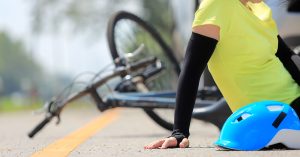 New federal data shows a 2.4 percent reduction in overall traffic deaths last year. But that’s not the full story. The roads were not any safer for pedestrians and bicyclists last year. These groups saw an increase in deaths, now making up nearly 20 percent of all traffic deaths. Many say it’s time to accelerate the conversation on safe road design.
New federal data shows a 2.4 percent reduction in overall traffic deaths last year. But that’s not the full story. The roads were not any safer for pedestrians and bicyclists last year. These groups saw an increase in deaths, now making up nearly 20 percent of all traffic deaths. Many say it’s time to accelerate the conversation on safe road design.
The Washington Post recently reported on the new data, which comes from the National Highway Traffic Safety Administration (NHTSA)’s Fatality Analysis Reporting System.
It shows nearly 36,600 people died in traffic accidents in 2018, a 2.4 percent decrease from 2017, according to The Washington Post. Traffic experts cite several areas of progress. There were fewer deaths caused by speeding and drinking and driving, and a 10 percent reduction in children’s fatalities. Motorcycle fatalities also declined about 5 percent.
What remains troublesome is bicyclists and pedestrians are at high risk. Bicycle accidents and pedestrian accidents are claiming more lives than ever – about 20 percent of all traffic deaths combined. This is a sharp rise, particularly in pedestrian deaths. Just 10 years ago, pedestrians made up 12 percent of all traffic deaths. They now represent 17 percent of all traffic fatalities.
The data shows that 6,283 pedestrians were killed in 2018, a 3.4 percent increase. Another 857 people were killed on bikes or similar non-motorized vehicles, a 6.3 percent increase.
With this new data, many are considering our nation’s antiquated roads, which the Governors Highway Safety Association says were not designed to accommodate so many pedestrians and bicyclists. Over the past decade, cities have encouraged walking and biking as a way to beat the traffic congestion. But use has far exceeded the visions of planners, especially when you considered developments, such as bike-shares, e-scooters and self-driving cars.
The Governors Highways Safety Association further stated that a combination of initiatives would be necessary to improve safety for pedestrians and cyclists, from road engineering to educational approaches.
Pedestrian and Bike Safety in the Late Fall in Massachusetts
This is a challenging time of the year for bike commuters and pedestrians in Massachusetts. The days are getting shorter and darker. And you have to be aware of the statistics. According to the NHTSA data, about 76 percent of pedestrian traffic fatalities occur after dark.
If you walk, consider keeping a neon safety vest in your work bag. Wear it when you go to work and as you leave work. Continue to use crosswalks with traffic signal buttons. Cross with other people.
If you ride your bike, wear your bike helmet and use bike lights. Bike lights are required under Massachusetts law. You must have a white light in front of your bike and a red light in back. Read our article, Facts About Massachusetts Bicycle Laws, to learn more.
Free Legal Consultation – Boston Pedestrian and Bicycle Accident Lawyers
With more than 100 years combined experience, Breakstone, White & Gluck is a leading personal injury law firm in Boston. Our attorneys specialize in representing those injured in motor vehicle accidents, including pedestrians and bicyclists, in Boston, Cambridge and across Massachusetts. If you have been injured, learn your legal rights for seeking financial compensation for your losses, including medical expenses, lost wages and pain and suffering. For a free legal consultation, contact us at 800-379-1244 or 617-723-7676 or use our contact form.
National Teen Driver Safety Week is October 20-26, 2019
 National Teen Driver Safety Week will begin Sunday. While your teen may learn about this topic at school, parents can also become involved and learn alongside teens. Parents influence their children in many ways. If you can influence the discussion on safe driving, you could save a life.
National Teen Driver Safety Week will begin Sunday. While your teen may learn about this topic at school, parents can also become involved and learn alongside teens. Parents influence their children in many ways. If you can influence the discussion on safe driving, you could save a life.
It’s a well-known and tragic fact: motor vehicle crashes are the leading cause of death for teens. In 2017 alone, 2,526 teens were killed in crashes, according to the to the National Highway Traffic Safety Administration (NHTSA).
This is the 12th year that National Teen Driver Safety Week has been observed. Two Pennsylvania lawmakers, Congressman Charlie Dent (R-PA) and Senator Bob Casey (D-PA), introduced the legislation establishing the annual event in October 2007.
National Teen Driver Safety Week highlights many topics, including graduated licensing laws, distracted driving, speeding and obeying fundamental traffic laws. It also provides resources on helping teens through their first few weeks as a licensed driver, along with handling stressful and emotional driving situations, including car accidents. Visit teendriversource.org to learn more.
State Graduated Driver Licensing (GDL) Laws
We are going to write about graduating licensing laws because these are the foundation for teaching teens to drive safely. All 50 states have a law in place, but these vary in restrictions, according to the Insurance Institute for Highway Safety (IIHS). Florida was the first state to adopt a graduated licensing law for teens in 1996. Massachusetts lawmakers approved a Junior Operator Law in 2007, which increased driving training requirements and penalties.
The law places restrictions on teens with licenses between the ages of 16 ½ and 18. First, as you may know if you are a parent, teens have to obtain a learner’s permit. Next comes 30 hours of classroom training on Massachusetts motor vehicle laws and safe driving techniques. Beyond the classroom, there is another 18 hours of instruction, including 12 hours behind-the-wheel and 6 hours of observation.
Here are some of the restrictions under the Massachusetts Junior Operator Law:
Passenger Restriction. Teens are not allowed to drive with other passengers under age 18 until they have been licensed for 6 months. There is an exception for siblings.
Night Driving Restriction. Another restriction is teens cannot drive between the hours of 12:30 a.m. and 5 a.m.
Cell Phone Use Restriction. Teen drivers cannot use cell phones or mobile electronic devices. Texting while driving is also prohibited, for all other drivers in Massachusetts.
Teens can expect to receive a significant license suspension if they violate these restrictions. For instance, there is a 60-day license suspension if your teen is caught driving between 12:30 and 5 a.m. There is a 90-day suspension for a first offense of speeding. For the second offense, there is a full-year suspension.
Massachusetts’ Junior Operator Law violations
Visit teendriversource.org for more on National Teen Driver Safety Week.
Fewer Teen Drivers
In recent years, Massachusetts has actually reported a reduction in teen deaths and non-fatal injuries in drivers age 16 and 17. This is a positive development, except when you look closer. There has actually been an increase in hospital rates for crash injuries in drivers between 18 and 20 years old. The state and a Boston Globe analysis attribute this to the fact that many teens are now waiting to get their license until age 18. By doing so, teens can skip driver’s education, which became more expensive and time-consuming when the Junior Operator Law took effect.
If your teen delayed getting their license, make sure they take time to learn the fundamentals and get the practice they need. Driver’s education is a critical component to developing a safe driver.
About Breakstone, White & Gluck – Experienced Boston Car Accident Lawyers
The Boston personal injury lawyers at Breakstone, White & Gluck specialize in representing those injured in motor vehicle crashes in Massachusetts. With over 100 years combined experience, our car accident lawyers have the expertise to guide our clients to the best financial results in case involving motor vehicle accidents and truck crashes.
For a free legal consultation, contact us at 800-379-1244 or 617-723-7676. You can also use our contact form.



